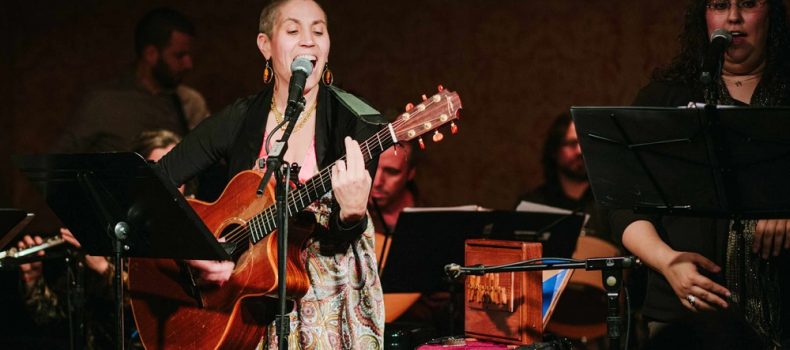Hazzan Jessi Roemer Releases ‘PRAISE’, a ‘Soulful’ New Album
While some musicians discourage concertgoers from singing along, for Hazzan Jessi Roemer, that’s entirely the point.
“I’m part of a movement of Jewish musicians who are trying to bring some of the older feeling, when people were huddled together in a small synagogue and space was intimate, and everybody was engaged in the singing,” Roemer said. “Singing is one of the most elegant ways to bring people together. When people are together and they sing, they can motivate and nurture them to go out and do community-oriented work.”
On Aug. 18, the Society Hill Synagogue cantor, 51, released her new album PRAISE. The nine original tracks are a modern interpretation of Jewish texts intended to be sung communally.
Rabbi Ari Lev Fornari of Kol Tzedek, where Roemer previously served as a prayer leader, described Roemer as a dynamic artist, soulful prayer singer and someone who is “birthing music which is medicine into this world.” Several of Roemer’s songs are even on the synagogue’s prayer list.
“It’s musically, spiritually and politically resonant. It has depth, it’s soulful and it simultaneously allows her voice to touch the heart and brings in a community of voices,” Fornari said of the new album. “My favorite of all of those is ‘Mikolot Mayim,’ which is about the sounds of the water. We do that almost every night at Kol Tzedek, and I feel really connected to it and really associate it with her.”
Roemer describes her music as a 21st-century hybrid of European, Middle Eastern, Sephardic, North and South American styles. The lyrics are a mixture of English, Hebrew and some Arabic. A lot of her inspiration comes from reading Jewish scripture. Other times, she’ll be biking home from work when a melody pops into her head. Once she begins writing, she’ll elicit feedback from others, which leads to tweaks and new ideas.
It’s all part of a process that began for her at a young age.
Roemer grew up in Silver Spring, Maryland, where she was raised on Jewish music. Her family was part of a chavurah, where close-knit communal singing was a stable. Her mother, Sue Roemer, was a cantor and member of bluegrass-klezmer band the Fabrangen Fiddlers from 1973 until her death in 2010. She was a huge influence on Roemer’s passion for music. Looking back, Roemer laughed at having become a cantor like her mother, describing herself as the “apple that fell far away from the tree and then rolled back.”
In the ’90s Roemer graduated from Oberlin College and moved to Israel for work. For a decade, she worked various jobs in Jerusalem, all while singing at festivals and cafes. She stepped away from music after returning to the U.S. Instead, she got a master’s degree in creative writing from Brooklyn College and began a career of teaching writing.
When her children were born about a decade later, it was a turning point for her professionally as well as personally, leading her to return to music in a deeper way. Music was an “instant communicator,” she said, something she could experience with her kids long before they were able to read.
“So that was one reason that I started going back to music professionally, but actually, to be really honest, another reason was that when my kids were little, I had a very limited amount of brain cells available to do anything except [parent], which is this huge learning curve,” Roemer said. “It’s totally, utterly consuming, and I was getting no sleep. And, in a sense, the music went further back. It was an older muscle memory in my body, and I could do that on less sleep and fewer brain cells than creative writing.”
Roemer enrolled in the six-year-long ALEPH Cantorial Program in 2011, which led to the formation of a nine-member band in 2013. Originally called Sonic Theology, the band changed its name to Ezuz and released its first album in 2015.
Roemer continues to perform with Ezuz, but her album was produced with almost an entirely new cast of musicians.
One of those collaborators was Joey Weisenberg. He’s the founder and co-director of Hadar’s Rising Song Institute.
“Jessi has been a major player in Philadelphia’s Jewish music scene,” Weisenberg said. “A very collaborative musician, she thrives on working with people, collecting ideas of the group, then bringing all of those ideas together into something beautiful.”
The album’s release show, co-sponsored by Hadar’s Rising Song Institute and Kol Tzedek, will be at the The Rotunda on Sept. 5. All proceeds will go to the Refugee and Immigrant Center for Education and Legal Services and the climate activist nonprofit 350.org.
“If you enjoy singing in a group of people, this is for you. You don’t have to have Jewish knowledge or musical expertise. It’s very participatory. It’s very user friendly. It’s part of an opportunity to create some sacred space together,” Roemer said. “It’s looking into the heart at what some of these texts are saying and feeling deeply how they apply to us in our daily reality.”
eschucht@jewishexponent.com; 215-832-0751

